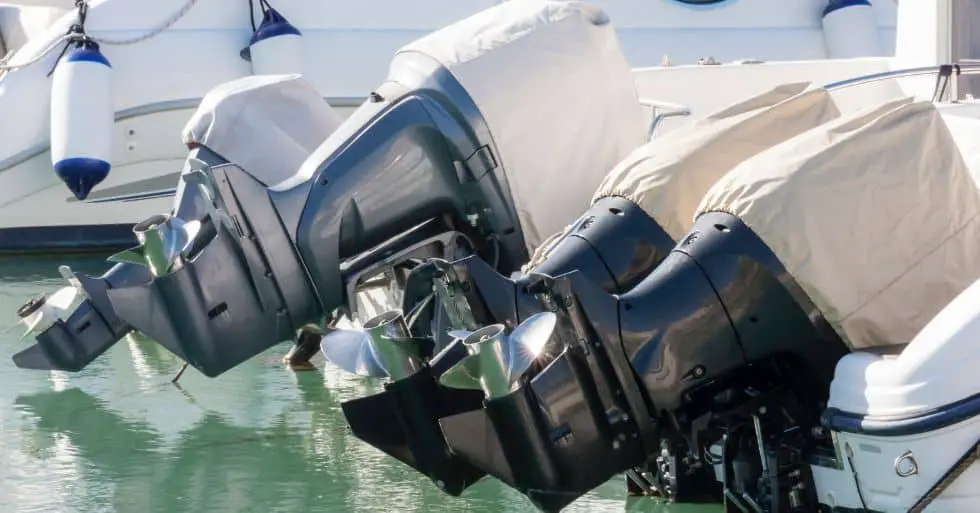Whether you’re in the market for an upgrade, or just want to know what’s out there. I’ve done the research to make sure you have all the information you need to make an informed decision when making a purchase as potentially big as this one.
The price of a boat motor is primarily affected by how much horsepower the engine has. A low 2.5 horsepower outboard will only cost around $1,000. A mid-sized one with 115 horsepower will cost around $12,000, and a large outboard with 300 horsepower will cost around $26,000.
This article will focus primarily on outboard motors as they are much easier to price when compared to inboard motors. Inboards generally cost about 10-25% more than similar horsepower outboard motors.
The average cost of boat motors based on horsepower
It can be hard to find the most up-to-date numbers in a market that has seen so many ups, downs, and supply-chain shortages throughout the last couple of years. However, I can still give you a great idea of the average costs that you will likely see when looking to buy a new motor.
New Outboard Motor cost
| Horsepower (hp) | Average Cost of Motor |
| 2.5 | $1,000 |
| 5 | $1,600 |
| 10 | $4,000 |
| 25 | $5,000 |
| 45 | $6,500 |
| 60 | $9,000 |
| 90 | $11,000 |
| 115 | $12,000 |
| 150 | $16,000 |
| 200 | $20,000 |
| 300 | $26,000 |
| 350 | $30,000 |
| 400 | $39,000 |
| 500 | $90,000 |
| 600 | $93,000 |
As you can see, there is quite a big range for many of these motors, and although you will find varying information out there, this chart will give you a very good “ballpark” for what you can expect to find on the market.
Inboard Motors
There is much less information out there on inboard motors as different brands charge significantly different prices, but in general, you can expect to pay anywhere from 10-25% more for the same horsepower as an outboard motor. However, these engines will likely run longer before needing a tune-up!
Used Motors and Depreciation
Although it would not be feasible for me to give you the average cost of a used motor since there are far too many variables associated with it. I am able to tell you that the average amount of depreciation for a boat motor is around 10% every year. So, by doing some simple math, we are able to come up with another table that shows what you may expect to see in the used market for an engine around 3 years old.
| Horsepower (hp) | Average Cost of a 3-year-old Outboard Motor |
| 2.5 | $700 |
| 10 | $2,800 |
| 25 | $3,500 |
| 45 | $4,550 |
| 60 | $6,300 |
| 90 | $7,700 |
| 115 | $8,400 |
| 150 | $11,200 |
| 200 | $14,000 |
| 300+ | $18,400+ |
Even though this chart will give you a good idea of what to expect for used engines, there are so many more variables to consider such as the conditions of the motor, hours, what it was used for, etc.
Related articles: Inboard vs. Outboard Motor (Ultimate Comparison) / How Long Do Outboard Motors Last?
New vs. Used motors
New
Just like buying a new or used boat, there are always pros and cons to each.
Used
Here are the pros and cons for a used motor:
In the end, deciding whether or not to buy a new or used motor comes down to personal preference, budget, and timeline. Hopefully, you are able to make a more informed decision based on these recommendations!
Related article: New vs. Used Boat: What Should You Buy?
Brands
The last big question that people will ask me is what brand I trust the most. Although this is something I used to put much more thought and weight behind, the truth is that manufacturers nowadays are creating amazing motors that are very comparable to each other.
The good news for you is that if you are able to track down a motor from one of the big manufacturers, the likelihood that you are getting a quality motor is quite high.
Here are 4 of the top brands that continue to produce high-quality motors: (in no particular order)
- Mercury
- Suzuki
- Honda
- Yamaha
Another factor that has really increased in importance over the last few years is the availability of parts. This is why I would highly recommend that if you are in the market for a used motor, instead of searching out for a specific brand, find a local small-engine repair shop that you trust, and ask them what motors they most like to work on, and which ones they have been able to consistently get parts for.
Having someone local who you trust, and who really knows your engine can give you incredible peace of mind when buying any motor.
Conclusion
If you’ve made it this far, chances are that you are thinking pretty seriously about purchasing a new (or used) motor. Even though the market that you are trying to get into may look a lot less consistent than it has in years past, there are still plenty of great options out there if you know what you’re looking for!
My hope is that after reading this article, you…
- Have a better idea of whether you’re leaning more towards buying a new or used motor.
- Have a better understanding of how much the particular motor you’re looking for will cost, and what the average depreciation is for a motor every year.
- Have a more practical method for deciding which brand of motor to go with.
- What Is The Cheapest Way To Store A Boat? - February 28, 2023
- Do Boats Need Bottom Paint? (Uncovering the Truth) - February 2, 2023
- How Much Is Bass Boat Insurance? (Real Quotes) - January 18, 2023

